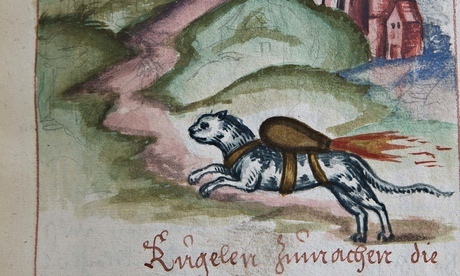Greer Gilman's Blog, page 56
March 6, 2014
Rocket cats!
Published on March 06, 2014 23:13
March 4, 2014
There’s cheer for the heavens
“As fit as ten groats is for the hand of an attorney, as your French crown for your taffeta punk, as Tib’s rush for Tom’s forefinger, as a pancake for Shrove-Tuesday, a morris for May-day, as the nail to his hole, the cuckold to his horn, as a scolding quean to a wrangling knave, as the nun’s lip to the friar’s mouth; nay, as the pudding to his skin.”
—William Shakespeare, All's Well That Ends Well
At eleven o’ clock on Shrove-Tuesday, “there is a bell rung called the Pancake-Bell, the sound whereof makes thousands of people distracted and forgetful either of manner or humanitie. Then there is a thing cal’d wheat’n flowre, which the sulphory, necromanticke cookes doe mingle with water, eggs, spice, and other tragicall, magicall inchantments, and then they put it little by little into a frying-pan of boyling suet, where it makes a confused dismal hissing--like the Lernean snakes in the reeds of Acheron, Stix, or Phlegeton--until at last by the skill of the cooke it is transformed into the forme of a flap-jack, which in our translation is call’d a pancake...”
—John Taylor, the Water Poet, Jacke a Lent
ALL. The pancake-bell rings, the pancake-bell! Trilill, my hearts!
FIRK. O musical bell, still! O Hodge, O my brethren! There’s cheer for the heavens: venison-pasties walk up and down piping hot, like sergeants; beef and brewess comes marching in dry-vats, fritters and pancakes comes trowling in in wheel-barrows; hens and oranges hopping in porters’ baskets, collops and eggs in scuttles, and tarts and custards comes quavering in in malt-shovels.
—Thomas Dekker, The Shoemaker’s Holiday
Nine
—William Shakespeare, All's Well That Ends Well
At eleven o’ clock on Shrove-Tuesday, “there is a bell rung called the Pancake-Bell, the sound whereof makes thousands of people distracted and forgetful either of manner or humanitie. Then there is a thing cal’d wheat’n flowre, which the sulphory, necromanticke cookes doe mingle with water, eggs, spice, and other tragicall, magicall inchantments, and then they put it little by little into a frying-pan of boyling suet, where it makes a confused dismal hissing--like the Lernean snakes in the reeds of Acheron, Stix, or Phlegeton--until at last by the skill of the cooke it is transformed into the forme of a flap-jack, which in our translation is call’d a pancake...”
—John Taylor, the Water Poet, Jacke a Lent
ALL. The pancake-bell rings, the pancake-bell! Trilill, my hearts!
FIRK. O musical bell, still! O Hodge, O my brethren! There’s cheer for the heavens: venison-pasties walk up and down piping hot, like sergeants; beef and brewess comes marching in dry-vats, fritters and pancakes comes trowling in in wheel-barrows; hens and oranges hopping in porters’ baskets, collops and eggs in scuttles, and tarts and custards comes quavering in in malt-shovels.
—Thomas Dekker, The Shoemaker’s Holiday
Nine
Published on March 04, 2014 12:42
Five-ninths of Parnassus
"All five poet laureates of the United Kingdom, Northern Ireland and the Republic of Ireland this year are women. On the eve of International Women's Day this Saturday, they will perform together for the first time at the Women of the World festival at London's South Bank."
A cause for rejoicing!
SFWA, take note.
Nine
A cause for rejoicing!
SFWA, take note.
Nine
Published on March 04, 2014 12:33
February 28, 2014
February 24, 2014
Palette pleasers
Mondrian might have called this Cake.Walk:

This post-modernist Battenburg was created for the Art Fund in Britain, as part of a bake sale to raise money for museums. What a glorious idea! When I saw this page of edible masterworks, I thought first of rushthatspeaks
and their fabulous agar-agar cornucopia. Then casting way back, I remembered the Botticelli I'd once molded in marzipan: a Venus, on a genuine half shell.
rushthatspeaks
and their fabulous agar-agar cornucopia. Then casting way back, I remembered the Botticelli I'd once molded in marzipan: a Venus, on a genuine half shell.
And there are recipes! The Van-Gogh-inspired ploughman's lunch is particularly off the wall.
But what works of art would you like to do/see done? All Late Baroque looks like icing sugar anyway. Hmm. You could do Saint Theresa's ecstasy in angelhair, with artfully draped lasagna for her robes...
Nine

This post-modernist Battenburg was created for the Art Fund in Britain, as part of a bake sale to raise money for museums. What a glorious idea! When I saw this page of edible masterworks, I thought first of
 rushthatspeaks
and their fabulous agar-agar cornucopia. Then casting way back, I remembered the Botticelli I'd once molded in marzipan: a Venus, on a genuine half shell.
rushthatspeaks
and their fabulous agar-agar cornucopia. Then casting way back, I remembered the Botticelli I'd once molded in marzipan: a Venus, on a genuine half shell.And there are recipes! The Van-Gogh-inspired ploughman's lunch is particularly off the wall.
But what works of art would you like to do/see done? All Late Baroque looks like icing sugar anyway. Hmm. You could do Saint Theresa's ecstasy in angelhair, with artfully draped lasagna for her robes...
Nine
Published on February 24, 2014 16:14
February 22, 2014
The Islands of Chaldea
"...a bittersweet last encounter with DWJ":
The magnificent Diana Wynne Jones left one last manuscript for her sister Ursula to finish. Ursula has done so, splendidly it seems. But after all, she and Isobel were Diana's first audience. What I read of the typescript of Diana's longhand was heartbreakingly good. I am beyond thankful that it hasn't shattered in the finishing.
Crying, I rejoice.
Nine
The magnificent Diana Wynne Jones left one last manuscript for her sister Ursula to finish. Ursula has done so, splendidly it seems. But after all, she and Isobel were Diana's first audience. What I read of the typescript of Diana's longhand was heartbreakingly good. I am beyond thankful that it hasn't shattered in the finishing.
Crying, I rejoice.
Nine
Published on February 22, 2014 11:36
February 21, 2014
Change at Mnemosyne
Published on February 21, 2014 21:30
February 12, 2014
The searching Demeter

Go now, Persephone, to your dark-robed mother, go...

Persephone is lost indeed this winter, and her mother worn with seeking.
Nine
Published on February 12, 2014 16:21
February 11, 2014
O my!
This is lovely: the bibliophile Henry Wessells has presented a copy of Cry Murder! In a Small Voice to the Huntington Library, “looking out at the Pacific Ocean through the Burne Jones stained glass windows.” A slender octavo amid all the quartos and folios. They let him leaf through The Alchemist.
Over duck spring rolls a few weeks ago, Daniel Rabuzzi suggested that I give a copy to the Folger. I'm emboldened.
Nine
Over duck spring rolls a few weeks ago, Daniel Rabuzzi suggested that I give a copy to the Folger. I'm emboldened.
Nine
Published on February 11, 2014 09:20
February 9, 2014
Winter's Tales
This looks to be shaping into a lovely Boskone, with old friends and rare visitors. Here's my program:
Writers on Writing: In the Mood
Friday 17:00 - 17:50
Mary Kay Kare (M), Jo Walton, Scott Lynch, Greer Gilman
One of the most elusive qualities a story may possess, mood is also one of the most lasting memories that certain stories evoke. How does a writer accomplish this effect? What are a writer's most important mood-making tools: Word choice? Pace? What the characters themselves feel? Voice? Setting? What works have been most successful at setting a mood and making it memorable?
Oh nice! I've not done this panel before, and it's a teasing and enticing subject. Looking forward to the conversation.
Reading -- Greer Gilman
Friday 21:00 - 21:25
Greer Gilman
I'll be reading from the new Ben Jonson mystery, Exit, Pursued by a Bear. This one stars Inigo Jones, Kit Marlowe's ghost, Queen Mab, and the succession. I love it to pieces.
But oh dear. It's up against panels that I'd love to see, with people on them that I'd love to read to. Boskone did look for another slot for me, but the only one that opened up was opposite another of my panels.
I'll be doing this again at Vericon, I promise. And at Readercon.
Writers on Writing: Character Versus Characterization
Saturday 12:00 - 12:50
Jeffrey A. Carver (M), Sarah Beth Durst, Steve Miller, Greer Gilman, Steven Sawicki
The success of any story relies upon its characters. But writers can get confused between establishing a character and characterization. What's observable? What's hidden? What do we see on the page, and what do we feel when reading about this character as a whole? Writers discuss ways to more deeply develop characters, and how characterization can either get in the way or be used successfully.
Hmm. I think we'll need to start by defining "character" and "characterization." Chewy topic. Good people.
The Evolution of a Hero
Saturday 14:00 - 14:50
Jeffrey A. Carver (M), Debra Doyle, Jennifer Pelland , Greer Gilman
Heroes aren't born. They're made through a combination of choices and circumstances that mold them both internally as well as externally into someone powerful enough to represent a challenge to the story's antagonist. Has the once well-defined transition from zero to hero changed with the introduction of modern social structures? What about modern female characters who chafe against preconceived notions of who a hero is, what it means to be a hero, and how a hero is made? Are there differences between the growth of a hero for men and women? And what does this all mean for the antagonist?
I so want to talk about my girl in the labyrinth idea: there's a hero's journey all laid out, but a heroine's work—often—is to find a way.
Magicians in Society
Saturday 16:00 - 16:50
Tom Shippey (M), Nancy Holder, Sarah Beth Durst, Greer Gilman, Scott Lynch
How do magicians and their magic fit into the political, social, and class structures within an imagined society -- especially in worlds where most people don't possess such powers? What special challenges do magic-wielders face in a culture where magic isn't respected? Or even where it is? Moreover, what roles do science and scientists play in such a system, if any?
Good heavens, Tom Shippey!
What I want to talk about is the magic of true names in Earthsea. And Prospero. And (if it's not too impertinent), I'd like to talk a bit about the magic in my own books, which is ritual, societal: a collaborative work. And my own demi-goddess Galilean, Margaret, discovers science, breaking and remaking her world.
Nine
Writers on Writing: In the Mood
Friday 17:00 - 17:50
Mary Kay Kare (M), Jo Walton, Scott Lynch, Greer Gilman
One of the most elusive qualities a story may possess, mood is also one of the most lasting memories that certain stories evoke. How does a writer accomplish this effect? What are a writer's most important mood-making tools: Word choice? Pace? What the characters themselves feel? Voice? Setting? What works have been most successful at setting a mood and making it memorable?
Oh nice! I've not done this panel before, and it's a teasing and enticing subject. Looking forward to the conversation.
Reading -- Greer Gilman
Friday 21:00 - 21:25
Greer Gilman
I'll be reading from the new Ben Jonson mystery, Exit, Pursued by a Bear. This one stars Inigo Jones, Kit Marlowe's ghost, Queen Mab, and the succession. I love it to pieces.
But oh dear. It's up against panels that I'd love to see, with people on them that I'd love to read to. Boskone did look for another slot for me, but the only one that opened up was opposite another of my panels.
I'll be doing this again at Vericon, I promise. And at Readercon.
Writers on Writing: Character Versus Characterization
Saturday 12:00 - 12:50
Jeffrey A. Carver (M), Sarah Beth Durst, Steve Miller, Greer Gilman, Steven Sawicki
The success of any story relies upon its characters. But writers can get confused between establishing a character and characterization. What's observable? What's hidden? What do we see on the page, and what do we feel when reading about this character as a whole? Writers discuss ways to more deeply develop characters, and how characterization can either get in the way or be used successfully.
Hmm. I think we'll need to start by defining "character" and "characterization." Chewy topic. Good people.
The Evolution of a Hero
Saturday 14:00 - 14:50
Jeffrey A. Carver (M), Debra Doyle, Jennifer Pelland , Greer Gilman
Heroes aren't born. They're made through a combination of choices and circumstances that mold them both internally as well as externally into someone powerful enough to represent a challenge to the story's antagonist. Has the once well-defined transition from zero to hero changed with the introduction of modern social structures? What about modern female characters who chafe against preconceived notions of who a hero is, what it means to be a hero, and how a hero is made? Are there differences between the growth of a hero for men and women? And what does this all mean for the antagonist?
I so want to talk about my girl in the labyrinth idea: there's a hero's journey all laid out, but a heroine's work—often—is to find a way.
Magicians in Society
Saturday 16:00 - 16:50
Tom Shippey (M), Nancy Holder, Sarah Beth Durst, Greer Gilman, Scott Lynch
How do magicians and their magic fit into the political, social, and class structures within an imagined society -- especially in worlds where most people don't possess such powers? What special challenges do magic-wielders face in a culture where magic isn't respected? Or even where it is? Moreover, what roles do science and scientists play in such a system, if any?
Good heavens, Tom Shippey!
What I want to talk about is the magic of true names in Earthsea. And Prospero. And (if it's not too impertinent), I'd like to talk a bit about the magic in my own books, which is ritual, societal: a collaborative work. And my own demi-goddess Galilean, Margaret, discovers science, breaking and remaking her world.
Nine
Published on February 09, 2014 19:43
Greer Gilman's Blog
- Greer Gilman's profile
- 42 followers
Greer Gilman isn't a Goodreads Author
(yet),
but they
do have a blog,
so here are some recent posts imported from
their feed.





